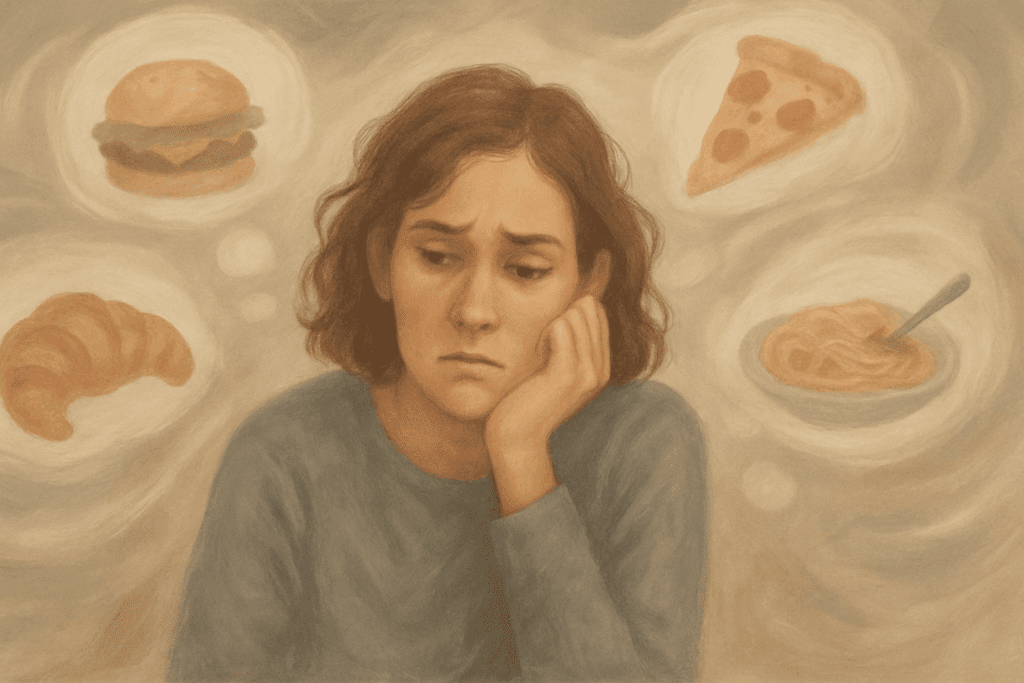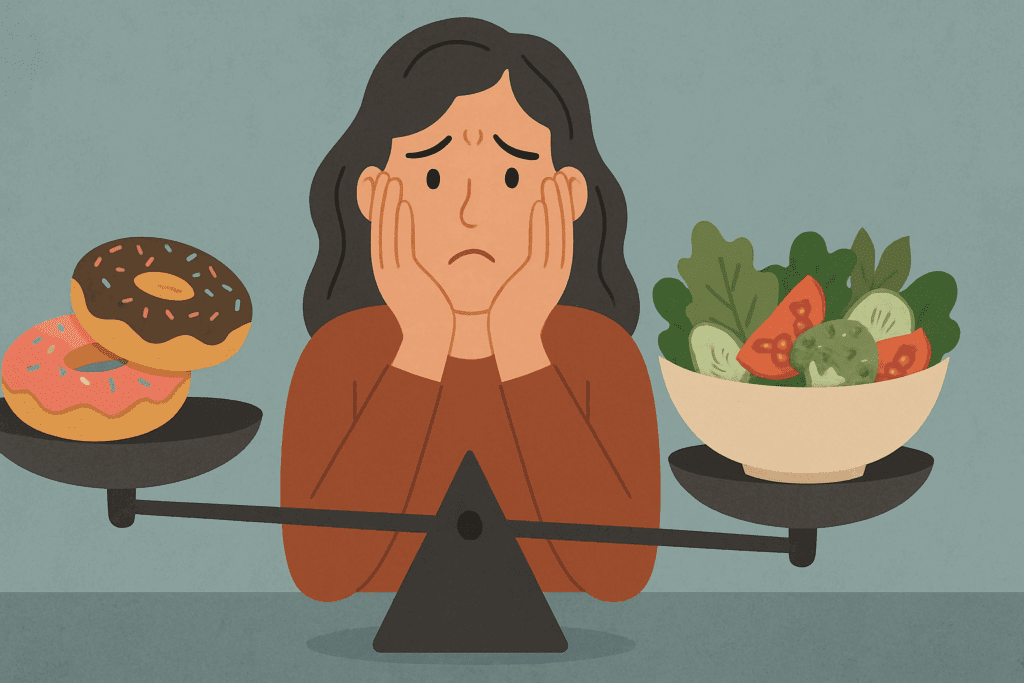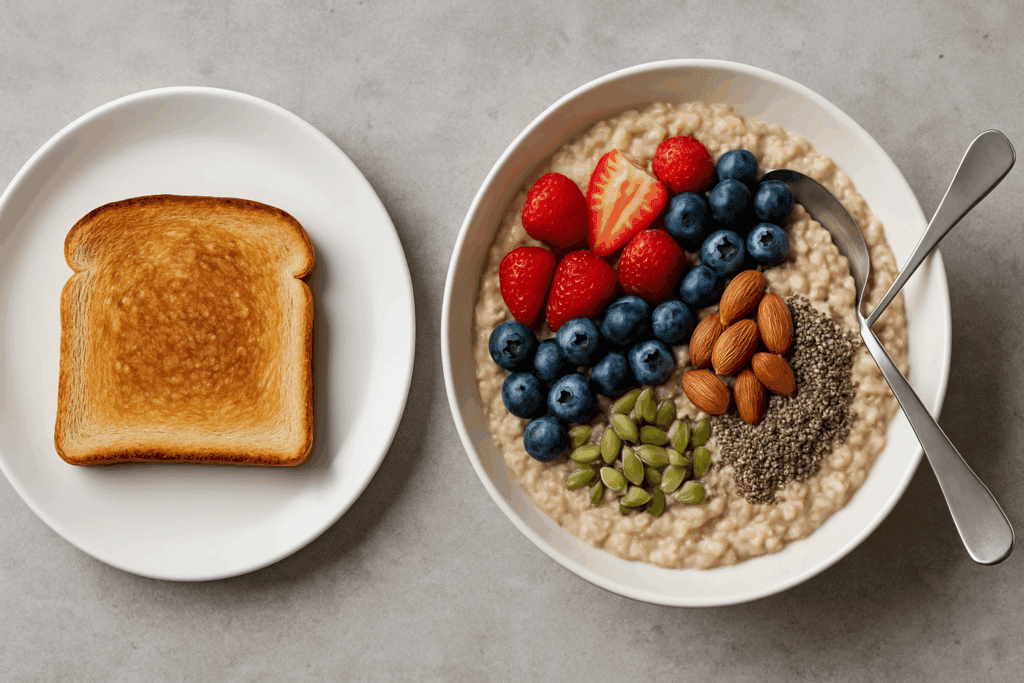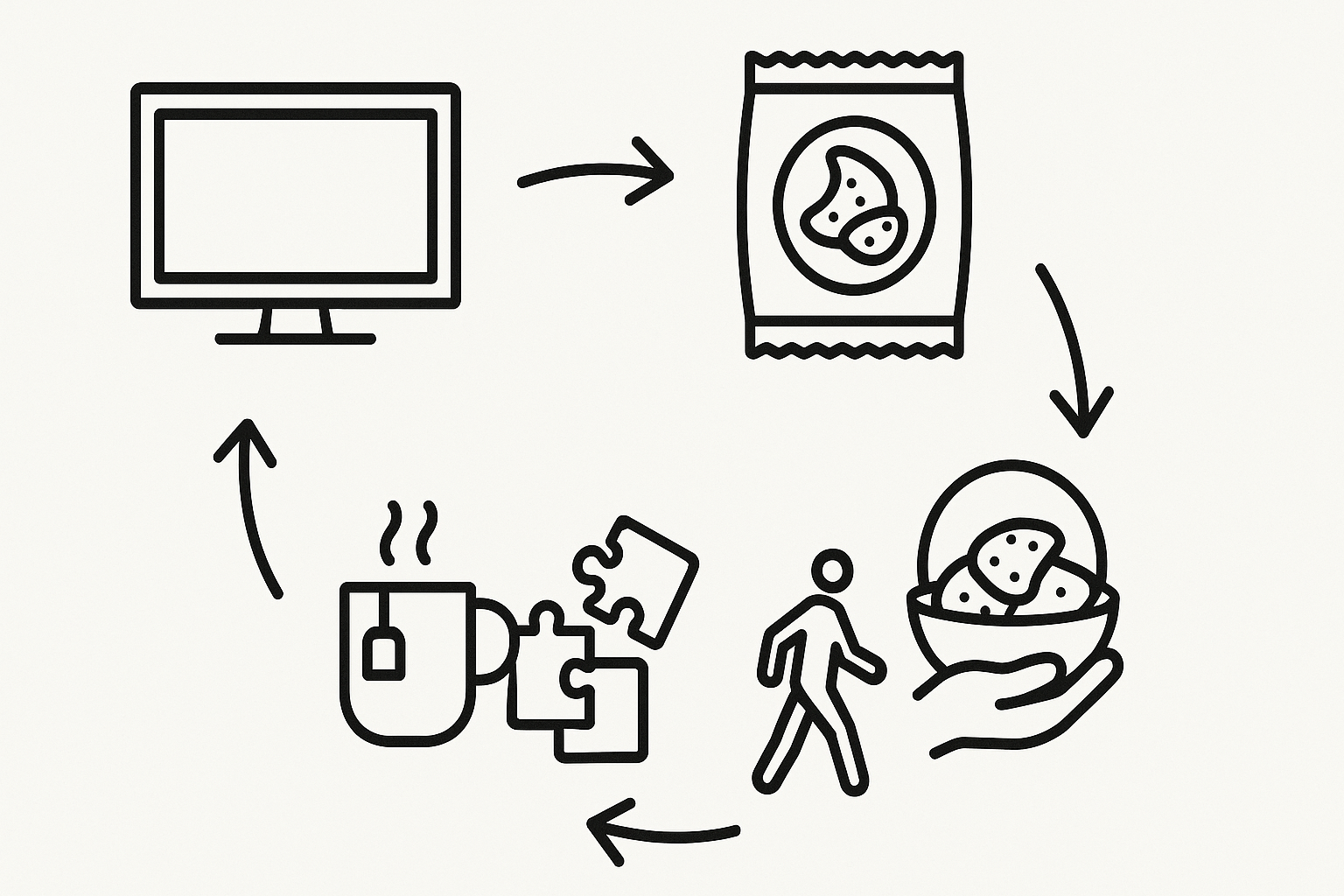Why Food Preoccupation Happens More Than You Think
Food is essential for survival, but for many people, it also becomes a source of ongoing mental chatter. You might find yourself thinking about food all day—what to eat next, how much you should eat, what you shouldn’t eat, or how to resist cravings. While some level of attention to food is normal, constant thoughts about eating can interfere with your well-being, productivity, and self-esteem. Understanding the psychological, biological, and environmental reasons behind this preoccupation is the first step toward making meaningful change.

A common driver of obsessive food thoughts is restriction. Dieting, skipping meals, or labeling certain foods as “bad” can increase the brain’s focus on those exact items. Your body interprets restriction as deprivation, which in turn ramps up cravings and mental fixation. This biological survival mechanism isn’t a sign of weakness—it’s your body trying to protect you from perceived famine. Over time, this response creates a loop of obsession, guilt, and overeating. If you’re wondering how to stop thinking about food all the time, addressing restrictive eating is an important first step.
Emotional eating also plays a powerful role in food preoccupation. When food becomes a go-to coping mechanism for stress, boredom, sadness, or even happiness, the brain begins to associate eating with emotional relief. This makes food feel even more appealing during emotionally charged moments, whether or not physical hunger is present. Learning to identify these emotional triggers and respond with non-food coping strategies can help ease the mental grip that food holds on your attention.
You may also like: How Mindful Eating Habits Can Help You Make Healthier Food Choices: Expert Tips for Conscious Nutrition and a Balanced Lifestyle

The Hidden Impact of Diet Culture and Food Rules
Diet culture promotes the idea that thinness equals health and worthiness, often encouraging extreme food control in pursuit of weight loss. This mentality fosters an unhealthy relationship with food and can increase food-related anxiety. People who adhere strictly to food rules—like avoiding carbs, fasting excessively, or eliminating entire food groups—tend to think about food far more often than those who eat with flexibility and balance.
Research supports this. Restrained eaters are more likely to ruminate on food and less likely to stop eating when full. Ironically, the very restrictions meant to control eating often lead to bingeing or overconsumption later on. This paradox keeps people stuck in a cycle of guilt and shame, reinforcing the idea that they can’t be trusted around food. If you’re searching for how to not think about food obsessively, dismantling these internalized rules is key.
A more effective and psychologically sound approach is intuitive eating. This evidence-based philosophy encourages people to listen to their internal cues—hunger, fullness, satisfaction—rather than follow external rules. Intuitive eating promotes food neutrality, meaning no food is inherently good or bad. As a result, food loses its moral charge, and its grip on your mental space loosens. Practicing intuitive eating over time can dramatically reduce the mental noise surrounding food decisions and help restore trust in your body.

Hunger, Satiety, and the Power of Nutrient Density
Thinking about food all the time might also mean you’re simply not eating enough—or not eating enough of the right things. Meals that are low in calories, protein, fat, or fiber can leave you feeling biologically full but not truly satisfied. When meals lack staying power, your body quickly signals the need for more food, often through cravings or persistent thoughts. The brain responds by generating ideas about food, anticipating future meals, or obsessing over what you can and can’t eat.
Choosing meals that balance macronutrients and offer sufficient energy can reduce these thoughts significantly. For example, a breakfast of plain toast might leave you feeling unsatisfied, while a more balanced option—such as oatmeal with nut butter and fruit—can keep you full and focused for hours. The key is not just eating enough calories but eating foods that provide slow-digesting energy, especially from whole grains, legumes, vegetables, and healthy fats.
Equally important is satisfaction. Satiety isn’t only about fullness—it’s also about enjoying what you eat. Flavor, temperature, texture, and emotional connection all play roles in meal satisfaction. If you consistently eat meals that feel bland or joyless, your mind will continue to crave the pleasure that food can bring. You might keep thinking about food not because your body needs more fuel, but because your taste buds feel deprived. Learning to craft meals that are both nutritious and satisfying can help you feel more content and less preoccupied with eating.

Emotional Hunger vs. Physical Hunger
Emotional hunger mimics real hunger, but it’s driven by emotional states rather than a physical need for energy. It can arise suddenly and feel urgent, often prompting cravings for specific comfort foods like sweets, salty snacks, or carbs. If you’re someone who frequently turns to food during stress, sadness, or even celebration, you may be using eating as a form of emotional regulation. This is a learned behavior and a common one—but over time, it can increase the amount of mental space that food occupies.
To differentiate between emotional and physical hunger, ask yourself key questions: Did your hunger come on gradually or suddenly? Can any food satisfy you, or are you craving something specific? Do you feel hunger in your stomach, or is it more in your head? Emotional hunger often fades once the emotional need is addressed—through rest, connection, stress relief, or expression. When you develop other ways to process feelings, food no longer becomes the default.
Practices such as journaling, talking to a friend, meditating, or engaging in physical activity can help interrupt the pattern of emotional eating. The more tools you have for managing emotions, the less reliant you become on food for emotional regulation. Learning to respond to emotional triggers in new ways allows food to take its proper place in your life: supportive, pleasurable, and nourishing—but not a constant mental companion.

Mindfulness and Mental Rewiring for Food Thoughts
Mindfulness is a powerful practice that helps bring awareness to the present moment without judgment. When applied to eating, it can break the cycle of automatic thoughts and behaviors that often drive food obsession. Mindfulness allows you to observe your thoughts about food without acting on them immediately. Over time, this practice helps you create space between the urge to eat and the decision to eat, which fosters greater autonomy and self-trust.
One of the most effective ways to incorporate mindfulness is through mindful eating. This involves slowing down, savoring each bite, eliminating distractions, and tuning in to how your body feels before, during, and after meals. People who eat mindfully often report higher satisfaction, lower emotional eating, and a decrease in obsessive food thoughts. It’s not about eating perfectly—it’s about staying connected to your experience.
Meditation is another form of mindfulness that supports mental clarity and emotional regulation. Just ten minutes of daily meditation can reduce anxiety, enhance focus, and reduce reactivity to food cues. If you’re learning how to stop thinking about food all the time, mindfulness offers a calm, grounded pathway back to self-awareness and intentionality.

Breaking Habits and Disrupting Food Cues
Many thoughts about food are triggered by environment, habit, or routine. You might always crave popcorn during a movie, a sugary snack after a stressful meeting, or chips during TV time—not because you’re hungry, but because your brain has linked those settings with eating. These mental associations are built over time and reinforced by repetition. Breaking them requires awareness and strategic disruption.
Begin by identifying your food cues—what places, times, or emotions spark cravings or thoughts of food? Once you recognize these patterns, you can intervene by changing the routine. Instead of grabbing a snack every time you sit down to watch TV, try drinking a cup of tea, doing a puzzle, or stepping outside for five minutes. These small shifts weaken the automatic link between cue and behavior, helping your brain form new pathways.
Another way to break the habit of food fixation is to change your environment. Keep tempting foods out of immediate sight, reduce exposure to food-related media, and create meal times that are structured and intentional. These steps don’t eliminate food thoughts entirely but reduce their frequency and emotional pull. Over time, your mind learns to focus on other fulfilling activities, helping you discover how to not think about food quite so often.
When to Seek Professional Support
Sometimes, persistent food thoughts are a sign of deeper psychological concerns, such as disordered eating, chronic dieting, or body dysmorphia. If you’ve tried to reduce food obsession on your own but continue to struggle, it may be time to seek professional help. Therapists, registered dietitians, and eating disorder specialists can provide tools and support tailored to your unique challenges.
Cognitive-behavioral therapy (CBT) is a particularly effective treatment for addressing negative thought patterns around food and body image. It helps you reframe distorted beliefs, reduce anxiety around eating, and build coping skills for emotional triggers. Intuitive eating counseling and mindfulness-based approaches can also support long-term healing by addressing both behavioral and emotional aspects of your relationship with food.
It’s important to understand that seeking help is not a sign of failure—it’s an investment in your health and future. If food dominates your thoughts, interferes with daily life, or causes distress, professional support can be the key to finding peace and reclaiming mental space. Recovery is possible, and help is available.
Frequently Asked Questions (FAQ): How to Stop Thinking About Food All the Time
1. Can sleep quality affect how often I think about food during the day?
Yes, sleep quality plays a significant but often overlooked role in regulating appetite and food-related thoughts. Poor sleep affects key hunger hormones—ghrelin and leptin—resulting in increased appetite and a stronger mental focus on food. People who don’t get enough rest often experience more frequent and intense cravings, especially for high-calorie, carbohydrate-rich foods. When you’re fatigued, your brain seeks quick energy sources, which is one reason why you might be thinking about food more than usual. If you’re looking for how to stop thinking about food, improving sleep hygiene and aiming for 7–9 hours of restful sleep each night can help regulate these internal cues and reduce food preoccupation.
2. Are certain personality traits linked to obsessive food thoughts?
Personality can absolutely influence your mental relationship with food. Individuals who score high in traits like perfectionism or neuroticism may be more prone to food preoccupation, particularly if they’re also navigating restrictive eating habits or body image concerns. These traits can contribute to black-and-white thinking about food—categorizing it as “good” or “bad”—which tends to intensify cravings and mental chatter. Learning how to not think about food obsessively may involve addressing perfectionistic tendencies and developing cognitive flexibility. Working with a mental health professional can be particularly useful in reframing these deep-seated patterns and fostering a more relaxed mindset around eating.
3. How does hydration affect food-related thoughts?
Dehydration can mimic hunger, leading to confusion between thirst and appetite. When the body is mildly dehydrated, the brain may misinterpret signals, increasing the frequency of food-related thoughts and cravings. Staying well-hydrated throughout the day can help reduce this confusion, especially if you’re trying to figure out how to stop thinking about food unnecessarily. Drinking water before meals can also improve satiety and assist with digestion, making meals more satisfying and reducing the likelihood of continued food obsession afterward. Keeping a water bottle nearby is a simple but effective tool for improving interoceptive awareness and supporting mindful eating habits.
4. Can engaging in creative activities help reduce food preoccupation?
Yes, creative engagement is a powerful and underutilized method for reducing food-focused thinking. Activities like painting, writing, music, or crafting stimulate the brain’s reward system in ways that can compete with the dopamine-driven rewards of eating. When you’re immersed in a flow state—a highly focused mental state achieved during creative activity—your mind naturally redirects from cravings to deeper cognitive engagement. If you’re exploring how to not think about food all the time, regularly participating in creative outlets can serve as both a distraction and a fulfilling alternative to emotional or habitual eating. This redirection also strengthens neural pathways that support long-term behavior change.
5. Is gut health connected to mental preoccupation with food?
Absolutely. The gut-brain axis is a complex communication network between your digestive system and your brain. An imbalanced gut microbiome can influence mood, appetite, and even cravings through neurotransmitters like serotonin, most of which are produced in the gut. Emerging research suggests that a lack of microbial diversity may be linked to increased cravings for sugar and processed foods, which could explain why some people find it harder to stop thinking about food. Supporting gut health through fermented foods, prebiotic fibers, and a plant-diverse diet may help calm both digestive discomfort and mental fixation on eating. If you’re working on how to stop thinking about food regularly, nurturing your gut is a valuable and often overlooked strategy.
6. How do social influences impact persistent thoughts about food?
Social environments have a profound effect on eating behaviors and food-related thoughts. Constant exposure to social media content featuring food, body ideals, or dieting culture can unconsciously trigger cravings and increase self-consciousness around eating. This digital saturation can make it incredibly difficult to learn how to not think about food, especially when images of food are always within reach. Curating your media feed, unfollowing diet-centric accounts, and engaging with body-positive or intuitive eating content can reduce external pressure and mental food noise. Real-life social dynamics matter too—friends who promote balanced eating and non-judgmental attitudes can provide essential support in breaking food obsession cycles.
7. Are there any supplements that help reduce obsessive food thoughts?
Some emerging evidence suggests that certain nutrients may help support cognitive control and emotional regulation related to food. Omega-3 fatty acids, found in fatty fish or flaxseeds, may improve mood and reduce impulsivity, while magnesium can help regulate stress hormones that contribute to emotional eating. Chromium picolinate has been studied for its role in blood sugar control and appetite regulation, particularly in individuals prone to carbohydrate cravings. While supplements should not be seen as a magic fix for how to stop thinking about food, they can be helpful when used in conjunction with holistic lifestyle changes. Always consult with a healthcare provider before starting any supplement regimen to ensure safety and effectiveness for your individual needs.
8. Can hormone fluctuations increase food-related mental noise?
Yes, hormonal changes—especially those related to the menstrual cycle, thyroid function, or chronic stress—can significantly impact how often you think about food. For example, during the luteal phase of the menstrual cycle, progesterone and estrogen levels shift in a way that increases hunger and cravings, often for sweet or salty foods. Thyroid imbalances can also affect metabolism and appetite regulation, making food thoughts more frequent and intense. If you’re noticing cyclical patterns or unexplained increases in cravings, working with a medical professional to assess hormonal balance can be a crucial part of learning how to not think about food compulsively. Addressing these underlying physiological factors can lead to lasting mental clarity and better appetite regulation.
9. Does physical activity help reduce food thoughts, or can it make them worse?
It depends on the type and context of the exercise. Moderate, enjoyable physical activity—like walking, dancing, swimming, or cycling—can lower stress hormones and improve mood, both of which reduce the mental focus on food. However, excessively intense or prolonged workouts, especially without proper fueling, can backfire by increasing hunger and making it harder to stop thinking about food. If your goal is to move in ways that support body awareness and reduce cravings, choose activities that feel sustainable, restorative, and enjoyable. Movement should enhance your connection to your body—not serve as punishment or justification for eating. This balanced approach is essential for anyone learning how to stop thinking about food in a healthy, lasting way.
10. What are some future tools or technologies being developed to help people manage food obsession?
Emerging technologies are offering promising new ways to support individuals dealing with persistent food thoughts. AI-powered apps are now capable of offering personalized meal suggestions based on emotional triggers, hunger cues, and nutrient needs. Wearable devices are also being developed to monitor blood glucose variability in real time, helping users better understand the connection between blood sugar dips and mental food fixation. Additionally, virtual reality (VR) therapy is being explored to treat eating disorders by simulating triggering environments and helping users practice healthier coping responses. While these tools are still evolving, they represent a new frontier in addressing how to not think about food compulsively, combining neuroscience, data analytics, and behavioral therapy into actionable, real-world interventions.
Conclusion: Reclaiming Mental Space and Restoring Food Peace
Thinking about food all the time can be exhausting—but it’s not a life sentence. Whether the source is biological hunger, emotional need, habitual behavior, or dietary restriction, the path to peace begins with understanding. With compassion, consistency, and practical strategies, you can learn how to stop thinking about food and start focusing on what truly matters in your life.
From building satisfying, nutrient-rich meals to dismantling unhelpful diet rules and embracing mindfulness, there are countless ways to shift your relationship with food. When you stop moralizing food, begin listening to your body’s signals, and develop new tools for emotional support, food loses its obsessive power. You no longer feel at war with your cravings, your habits, or your hunger—you feel aligned, calm, and nourished.
If you’re looking for ways to break free from food fixation, know that you’re not alone. Many people are on the same journey, learning how to not think about food all the time and replacing stress with ease. With the right tools and a little patience, you can create a new relationship with food—one rooted in respect, trust, and balance. And in doing so, you’ll free up your mental energy to live a life that’s full, rich, and deeply satisfying in every sense.
Was this article helpful? Don’t let it stop with you. Share it right now with someone who needs to see it—whether it’s a friend, a colleague, or your whole network. And if staying ahead on this topic matters to you, subscribe to this publication for the most up-to-date information. You’ll get the latest insights delivered straight to you—no searching, no missing out.
mindful eating habits, emotional eating triggers, intuitive eating principles, food and mental health, how to control food cravings, breaking food obsession, healthy relationship with food, food fixation psychology, balanced nutrition strategies, overcoming food anxiety, mindful food choices, eating without guilt, how to manage emotional hunger, food and stress connection, coping mechanisms without food, stop food cravings naturally, brain and hunger signals, nutrition and mental clarity, healthy eating mindset, food thoughts and mindfulness
Further Reading:
Always Thinking About Food? Here Are 9 Tips on How to Stop
Weight loss: Gain control of emotional eating
How to stop thinking about food
Disclaimer
The information contained in this article is provided for general informational purposes only and is not intended to serve as medical, legal, or professional advice. While NewsHealthWatch strives to present accurate, up-to-date, and reliable content, no warranty or guarantee, expressed or implied, is made regarding the completeness, accuracy, or adequacy of the information provided. Readers are strongly advised to seek the guidance of a qualified healthcare provider or other relevant professionals before acting on any information contained in this article. NewsHealthWatch, its authors, editors, and contributors expressly disclaim any liability for any damages, losses, or consequences arising directly or indirectly from the use, interpretation, or reliance on any information presented herein. The views and opinions expressed in this article are those of the author(s) and do not necessarily reflect the official policies or positions of NewsHealthWatch.

